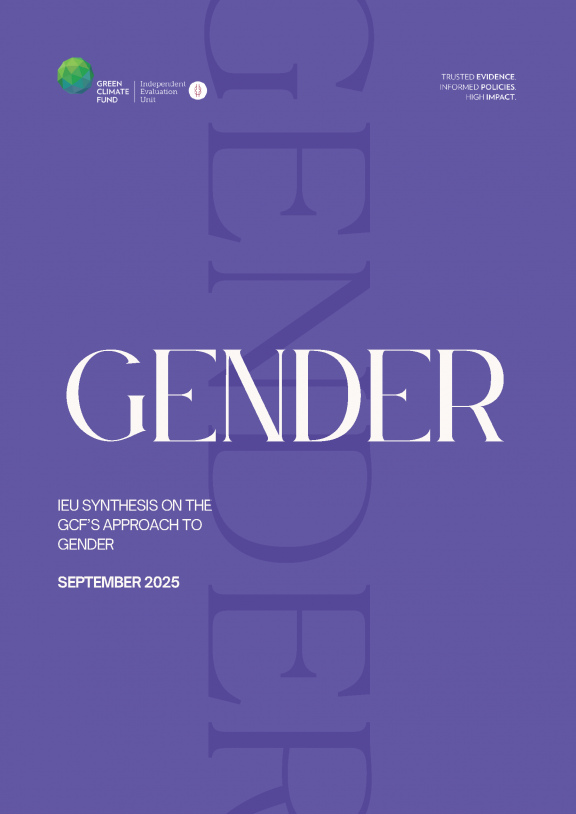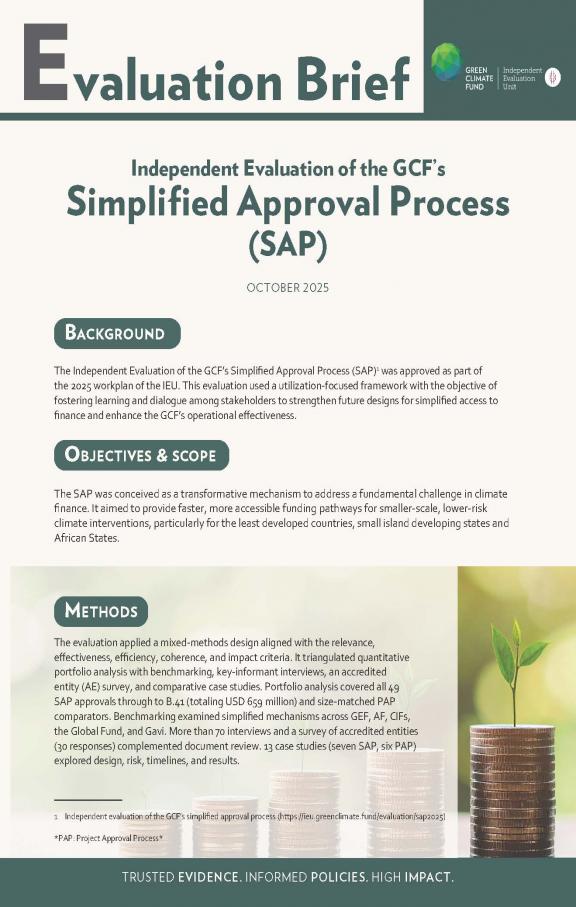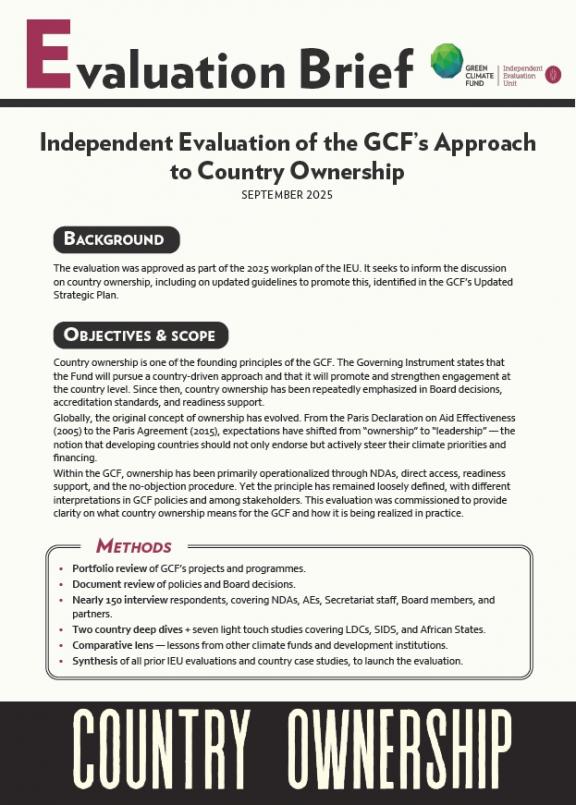IEU publications
IEU publications
To serve the needs of our stakeholders, the IEU issues a variety of publications related to our work, including in the context of evaluations and learning. Keep up with the IEU’s latest publications here.
Featured publications
Independent Evaluation of the GCF's Approach to Country Ownership (COA2025)
This independent evaluation of the Green Climate Fund’s (GCF) approach to country ownership was approved by the GCF Board as part of the 2025 workplan of the Independent Evaluation Unit (IEU) and is submitted in time for its forty-third meeting (B
Independent Evaluation of the GCF’s Simplified Approval Process (SAP2025)
The Green Climate Fund’s Simplified Approval Process (SAP) was created to make climate finance more accessible and responsive, thus enabling smaller, lower-risk projects to address urgent climate needs in vulnerable countries.
Independent Synthesis of the GCF’s Gender Approach
Approved at the fortieth meeting of the GCF Board (B.40), this formative Gender Synthesis consolidates insights from past evaluations, assessments, and studies to inform the forthcoming Independent Evaluation of the GCF’s Gender Approach.
MELting Silos: Mixing Evaluations with Monitoring & Learning Across the Green Climate Fund
This IEU Learning Brief, prepared jointly by the Independent Evaluation Unit (IEU) and the Department of Monitoring, Evaluation, and Learning (DMEL), examines how the Green Climate Fund (GCF) can better align its monitoring, evaluation, and learni
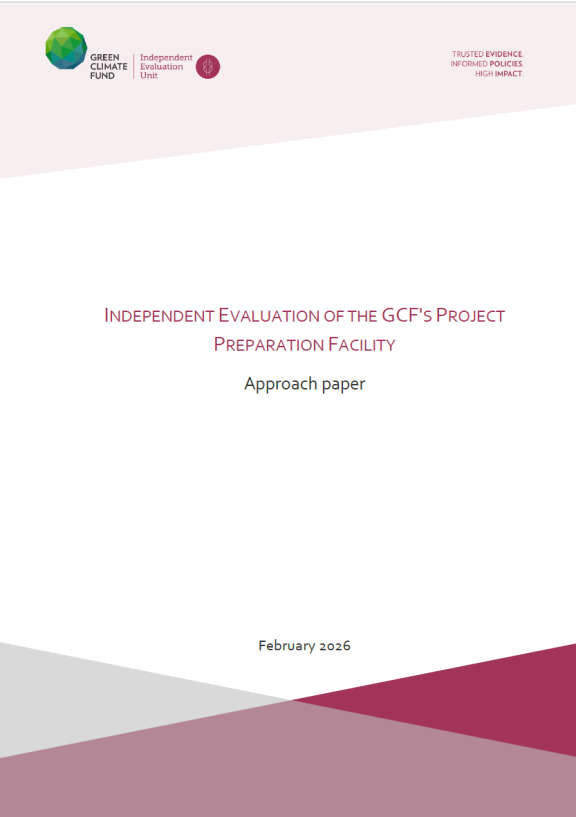
Approach Paper: Independent Evaluation of the Green Climate Fund’s Project Preparation Facility (PPF2026)
February 2026
This Approach Paper outlines the mandate, scope, and methodology for the evaluation of the Green Climate Fund's Project Preparation Facility. It presents the evaluation’s objectives, background, analytical framework, data sources, and timeline, alongside key deliverables and risk mitigation measures.
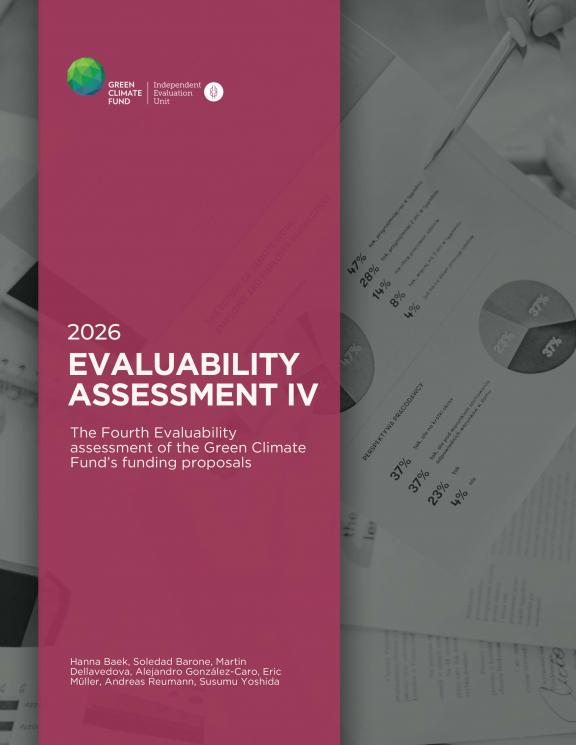
The Fourth Evaluability Assessment of the Green Climate Fund's Funding Proposals
January 2026
This report presents the findings of an Independent Evaluation Unit (IEU) desk-based assessment of the Green Climate Fund (GCF) portfolio, examining the evaluability of funded activities. It builds on insights from three previous assessments conducted in 2019, 2022, and 2024, offering a longitudinal perspective on progress and persistent challenges. The assessment pursues two core objectives. First, it evaluates the quality of approved and ongoing funding proposals (FPs), with the aim of...
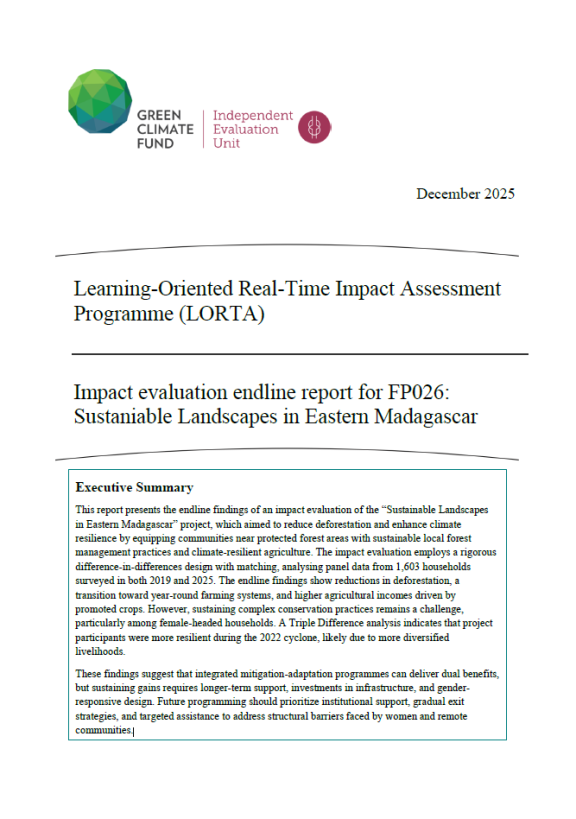
Impact evaluation endline report for FP026: Sustainable Landscapes in Eastern Madagascar
December 2025
This report presents the endline findings of an impact evaluation of the Sustainable Landscapes in Eastern Madagascar project, which aimed to reduce deforestation and strengthen climate resilience through sustainable forest management and climate-resilient agriculture. Using a rigorous difference-in-differences design and panel data from 1,603 households surveyed in 2019 and 2025, the evaluation finds reductions in deforestation, increased adoption of year-round farming systems, and higher...
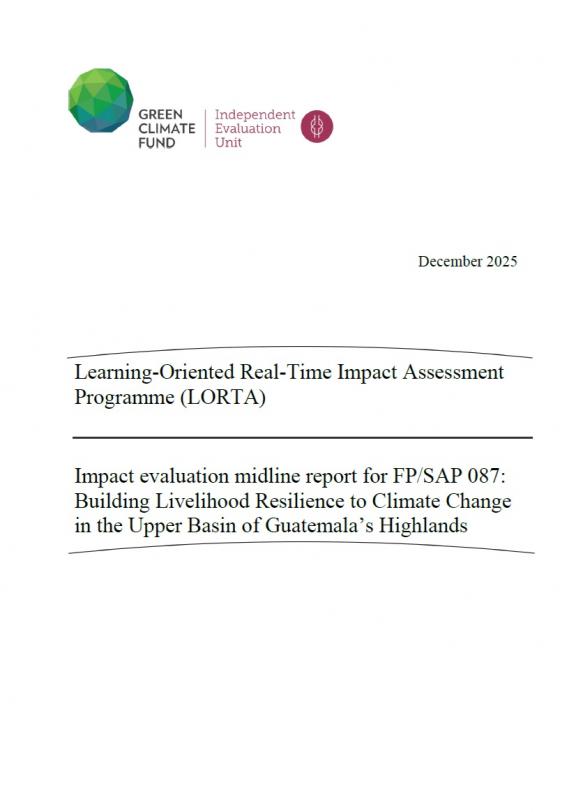
Impact Evaluation Midline Report for FP/SAP 087: Building Livelihood Resilience to Climate Change in the Upper Basin of Guatemala’s Highlands
December 2025
This report presents the midline findings of the project "Building Livelihood Resilience to Climate Change in the Upper Basins of Guatemala’s Highlands," implemented since 2021 to strengthen ecosystem and water management, diversify livelihoods, and enhance household resilience to climate-related shocks. The evaluation applies a quasi-experimental design and draws on data from 1,256 households across treatment and comparison micro-watersheds. Results show increased vulnerability to climate...
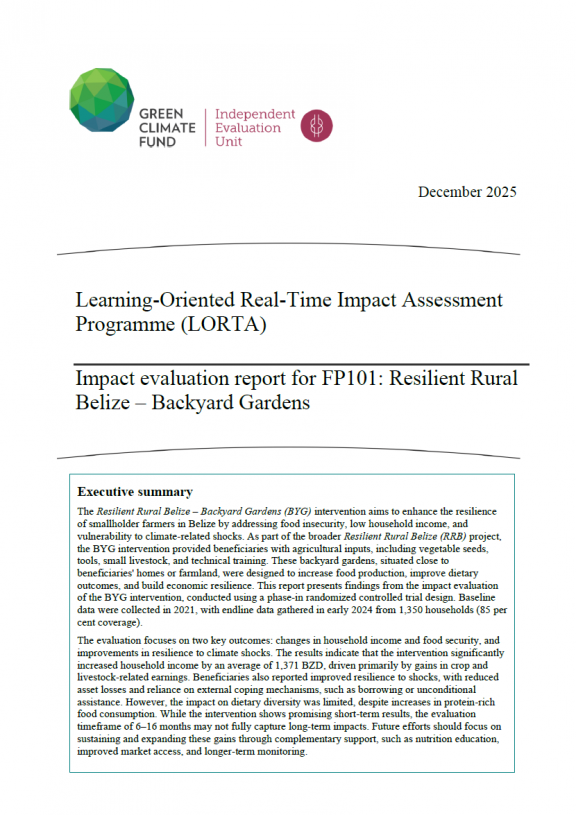
Impact evaluation report for FP101: Resilient Rural Belize – Backyard Gardens
December 2025
This impact evaluation, based on a phase-in randomized controlled trial, draws on baseline data collected in 2021 and endline data gathered in early 2024 from 1,350 households (representing 85 per cent coverage). It examines the programme’s effectiveness in improving household income and food security, as well as strengthening resilience to climate shocks. The findings show that the intervention increased incomes by an average of 1,371 BZD and strengthened resilience to climate shocks, with...
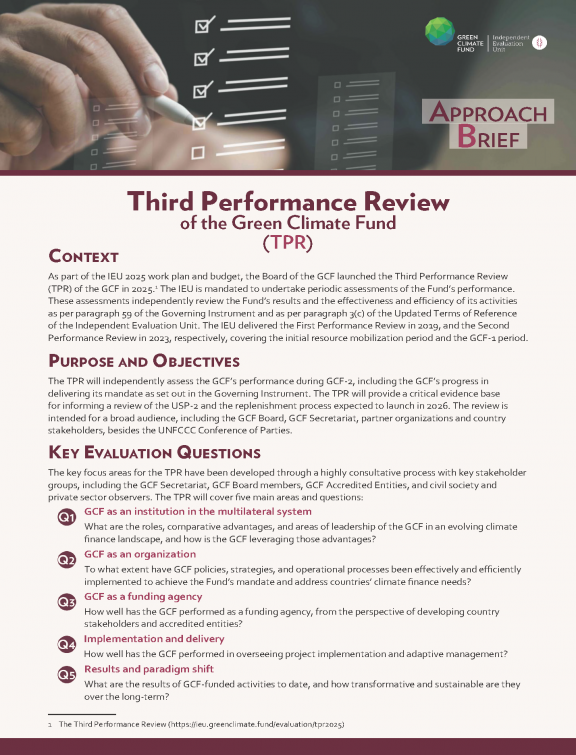
TPR: Approach Brief
October 2025
This two-page approach brief provides a concise overview of the approach paper for the Third Performance Review of the GCF, summarizing the context, purpose, objectives, scope, methodology, and timeline of the evaluation. It serves as a quick reference to the evaluation’s design and intended areas of analysis.
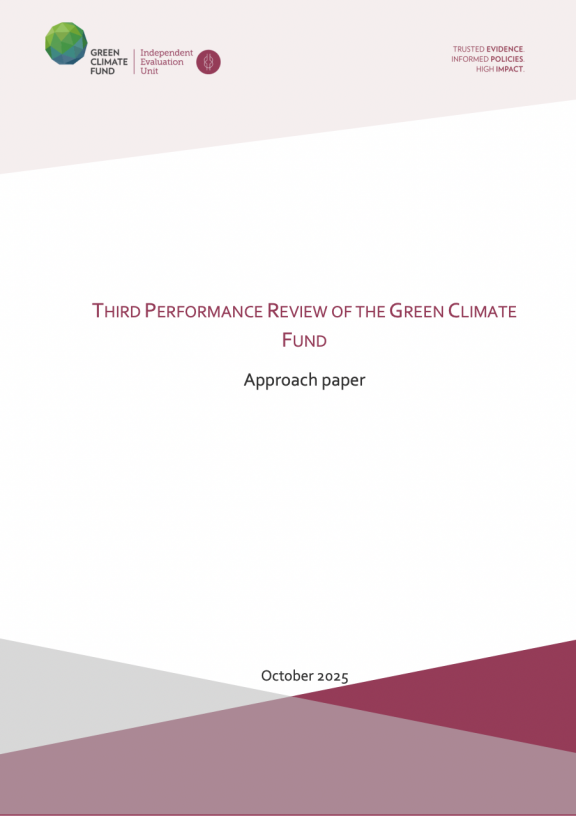
Approach Paper of the Third Performance Review
October 2025
The Third Performance Review of the Green Climate Fund will assess the Fund’s performance during the GCF-2 programming period (2024–2027) and inform the third replenishment and strategic planning for GCF-3. Guided by the Governing Instrument, the review will examine how effectively and efficiently the Fund has delivered on its mandate, its comparative advantages in an evolving climate finance landscape, and its progress toward promoting a paradigm shift to low-emission, climate-resilient...
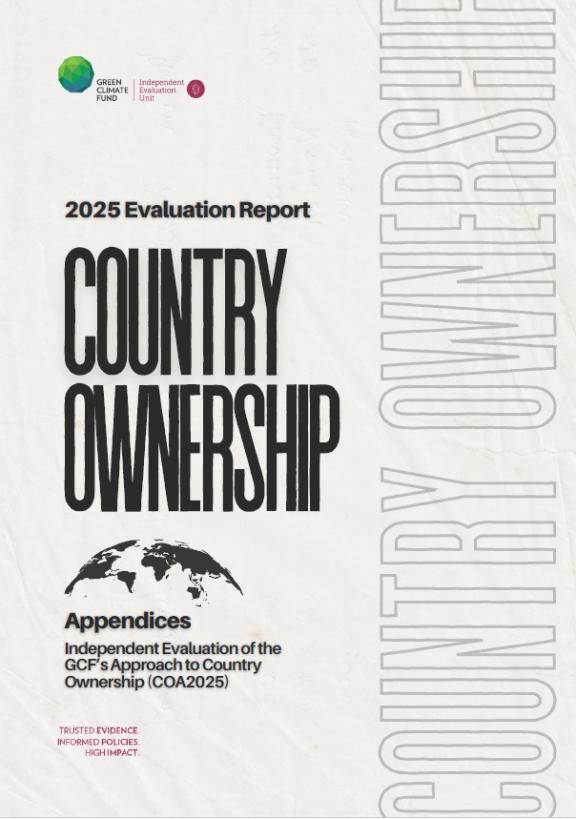
Independent Evaluation of the GCF's Approach to Country Ownership (COA2025): Appendices
September 2025
This document contains the appendices of the 2025 Independent Evaluation of the GCF’s Approach to Country Ownership. The appendices provide in-depth analytical materials that complement the main evaluation report. It includes a theory of change analysis and a detailed country ownership framework, as well as analyses of the correlation between country ownership, stakeholder engagement, and sustainability. The appendices also provide an overview of the placement of National Designated Authorities...
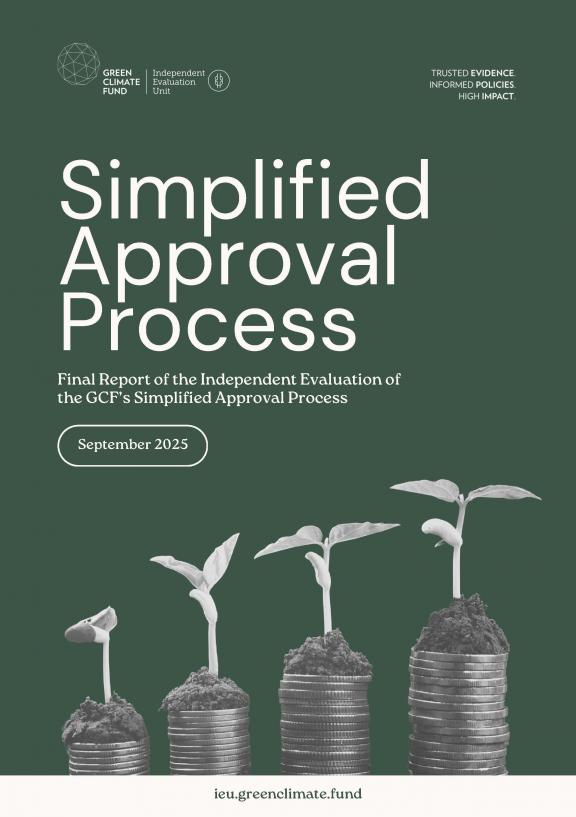
Independent Evaluation of the GCF’s Simplified Approval Process (SAP2025)
September 2025
The Green Climate Fund’s Simplified Approval Process (SAP) was created to make climate finance more accessible and responsive, thus enabling smaller, lower-risk projects to address urgent climate needs in vulnerable countries. Since its inception, the SAP has evolved through continuous learning and refinement, introducing tools and approaches to strengthen capacity, accelerate procedures, and simplify documentation. Building on its 2020 assessment, the Independent Evaluation Unit is conducting...
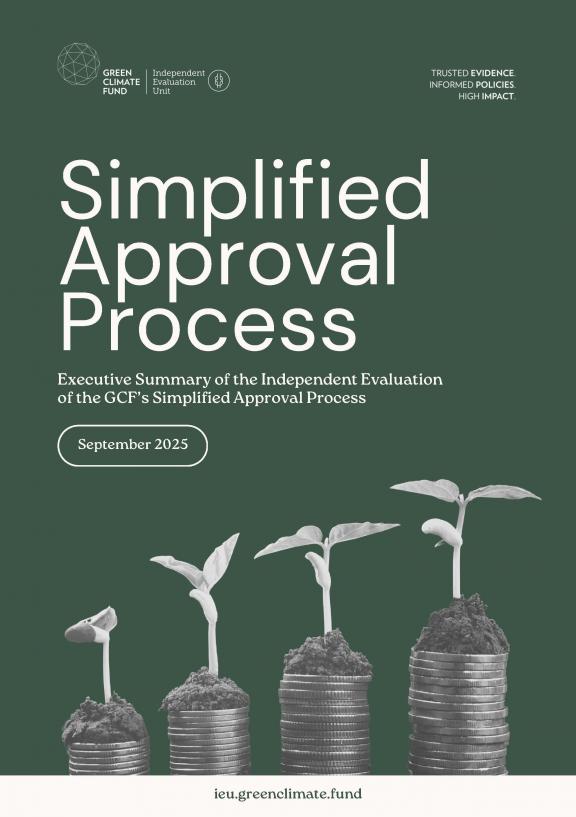
Executive Summary: Independent Evaluation of the GCF’s Simplified Approval Process
September 2025
The Simplified Approval Process (SAP) was established to deliver faster and more accessible climate finance for smaller-scale, lower-risk projects in countries most vulnerable to climate change. This executive summary of the Independent Evaluation of the GCF’s SAP presents the modality’s progress, key findings, conclusions, and recommendations, contributing to ongoing efforts to strengthen efficiency, accessibility, and impact across the GCF’s programming and the wider climate finance landscape...
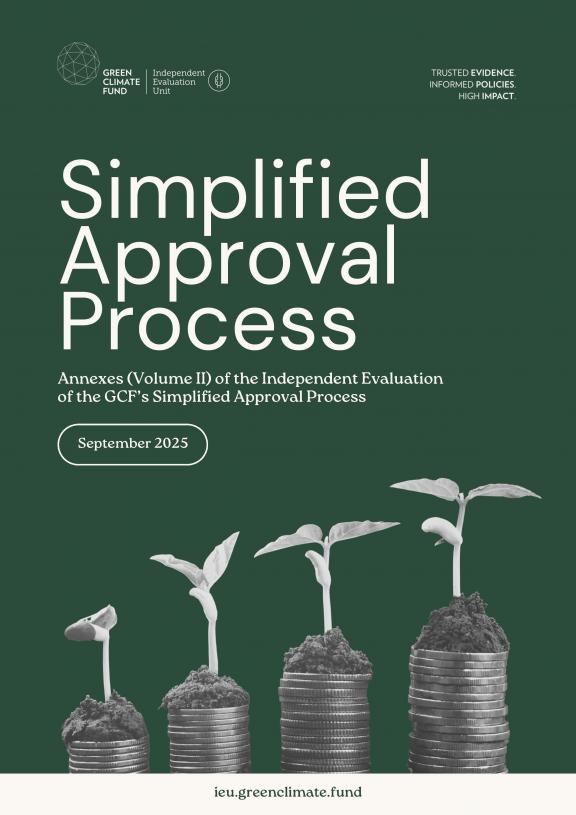
Independent Evaluation of the GCF’s Simplified Approval Process (SAP2025): Annexes
September 2025
This document presents the detailed annexes supporting the evaluation of the Independent Evaluation of the GCF’s Simplified Approval Process. It includes the underlying evidence, methodology, and supplementary materials that inform the analysis presented in the Final Report, where the evaluation’s key findings, conclusions, and recommendations are detailed.
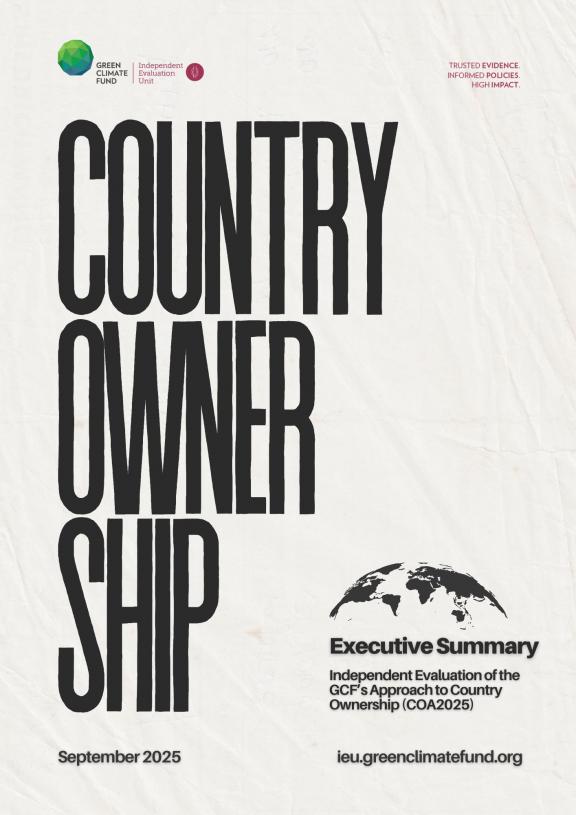
Executive Summary: Independent Evaluation of the GCF's Approach to Country Ownership (COA2025)
September 2025
This document presents the Executive Summary of the Independent Evaluation of the GCF’s Approach to Country Ownership (COA2025). It outlines the key findings, conclusions, and recommendations of the evaluation, which was conducted as part of the IEU’s 2025 workplan and submitted to the GCF Board ahead of its 43rd meeting. The evaluation assesses how the principle of country ownership is interpreted and implemented across the Fund’s operations, identifies systemic challenges, and offers guidance...
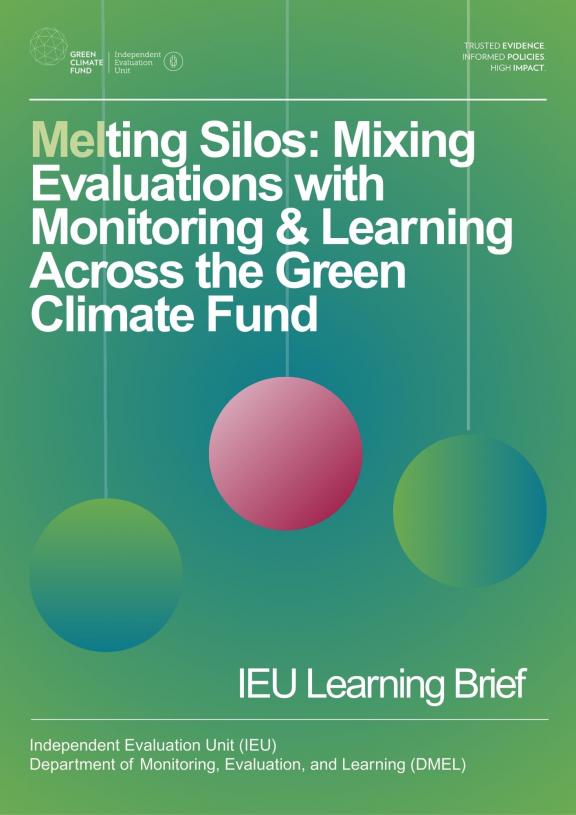
MELting Silos: Mixing Evaluations with Monitoring & Learning Across the Green Climate Fund
September 2025
This IEU Learning Brief, prepared jointly by the Independent Evaluation Unit (IEU) and the Department of Monitoring, Evaluation, and Learning (DMEL), examines how the Green Climate Fund (GCF) can better align its monitoring, evaluation, and learning (MEL) functions. It traces the evolution of MEL roles within the GCF, compares approaches from other multilateral funds, and identifies areas of complementarity and overlap between the IEU and DMEL. The brief highlights the importance of clear roles...
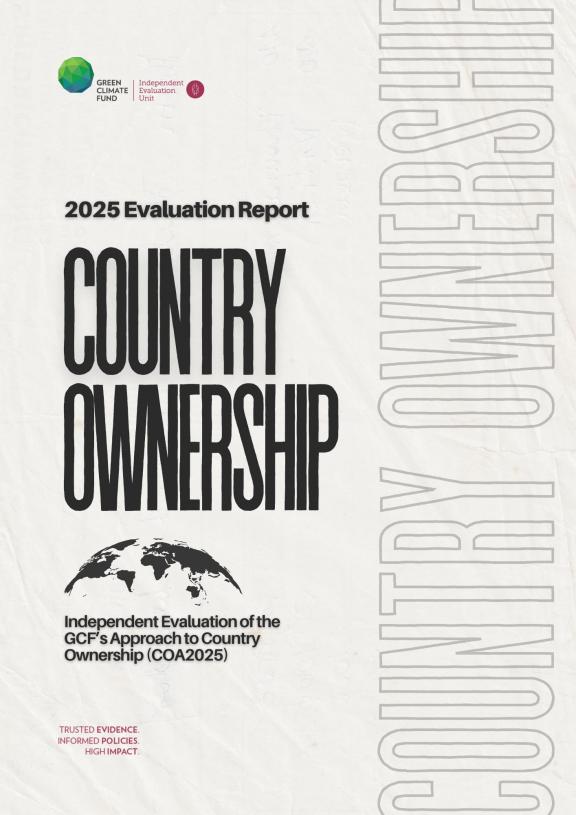
Independent Evaluation of the GCF's Approach to Country Ownership (COA2025)
September 2025
This independent evaluation of the Green Climate Fund’s (GCF) approach to country ownership was approved by the GCF Board as part of the 2025 workplan of the Independent Evaluation Unit (IEU) and is submitted in time for its forty-third meeting (B.43). It finds that, while country ownership is firmly embedded in the GCF’s Governing Instrument and policies, its operationalization remains uneven and fragmented, and makes recommendations to strengthen institutional arrangements and practices to...
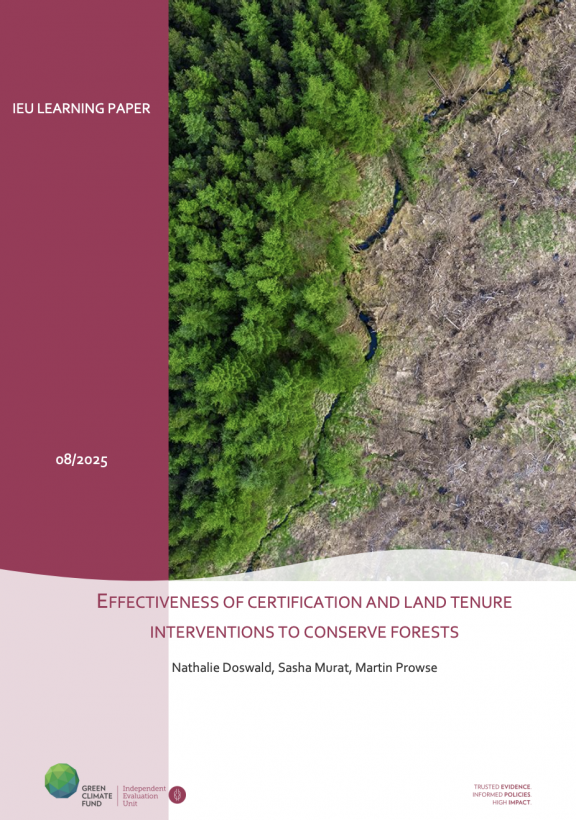
Effectiveness of certification and land tenure interventions to conserve forests - A systematic review
August 2025
This systematic review assesses the effectiveness of certification and land tenure interventions in reducing deforestation and improving forest conservation outcomes. The review synthesizes findings from 45 impact evaluations conducted in developing countries, drawing from systematic literature searches and a rigorous screening process. It aims to provide insights into which intervention types and implementation features contribute most effectively to conservation goals.
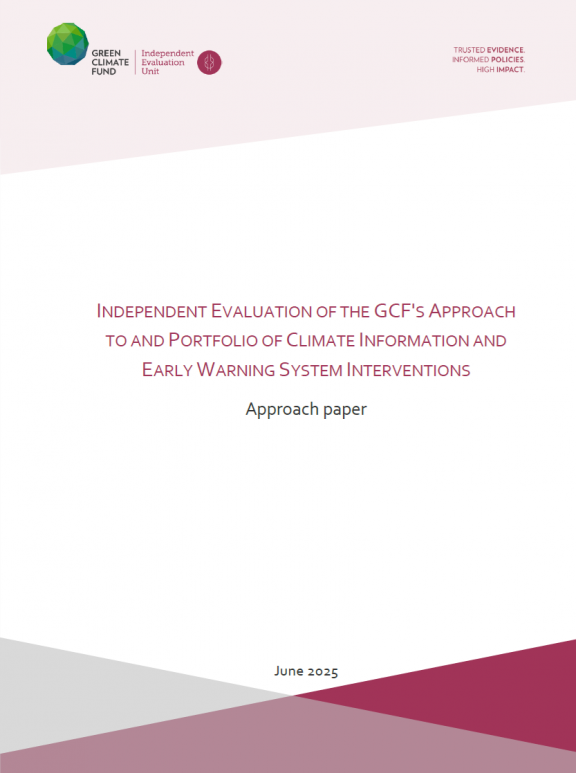
Approach Paper: Independent Evaluation of the GCF's Approach to and Portfolio of Climate Information and Early Warning System Interventions (CIEWS)
June 2025
This Approach Paper outlines the framework, methodology, and analytical pathways guiding the Independent Evaluation of the GCF's Approach to and Portfolio of Climate Information and Early Warning System Interventions (CIEWS). The document provides an overview of the global context for climate services, the growing risks posed by climate change, and the critical role of CIEWS in strengthening resilience and reducing disaster impacts. It presents the evaluation’s objectives, theory of change, and...
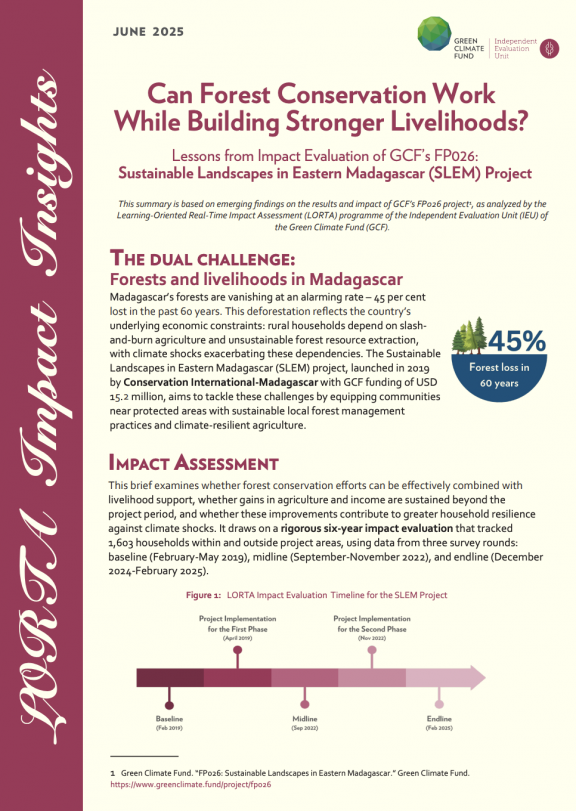
Impact Insights: Can Forest Conservation Work While Building Stronger Livelihoods?
June 2025
This Impact Insights brief presents emerging findings from the six-year impact evaluation of GCF’s FP026 project in Madagascar. Conducted under the IEU’s LORTA programme, the study explores how forest conservation efforts can align with improved livelihoods and resilience. The brief highlights reductions in deforestation, income gains from climate-resilient crops, and the importance of sustained support systems, especially for female-headed households.
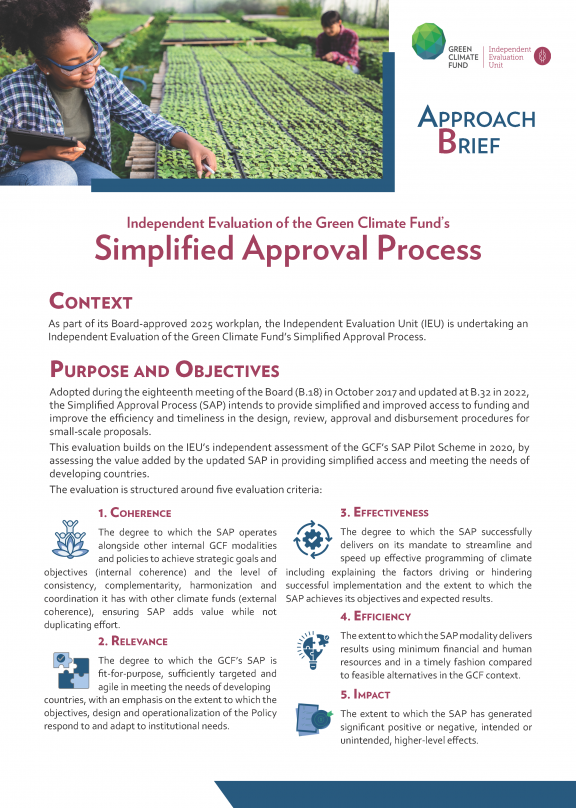
Approach Brief: Independent Evaluation of the Green Climate Fund’s Simplified Approval Process
June 2025
This brief summarizes the approach paper for the Independent Evaluation of the GCF’s Simplified Approval Process (SAP) modality. It outlines the evaluation’s context, purpose, objectives, scope, methodology, and timeline.
